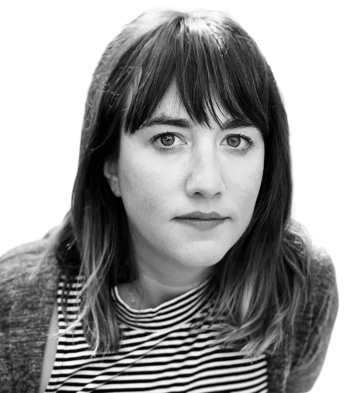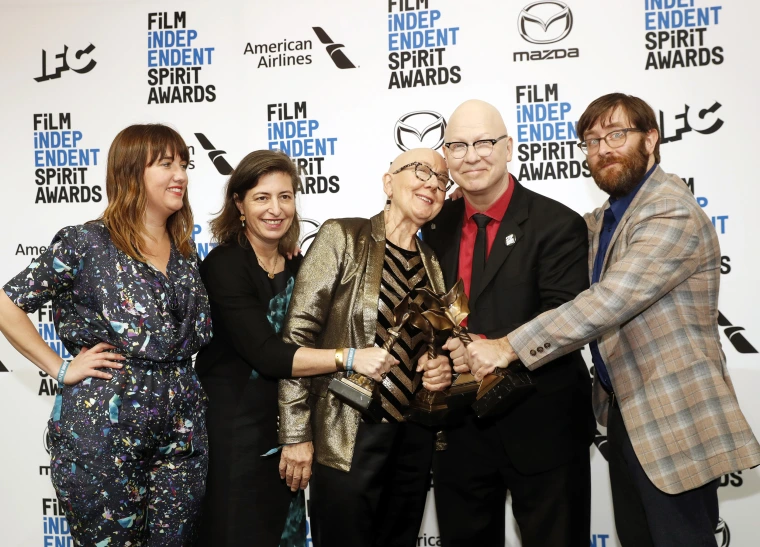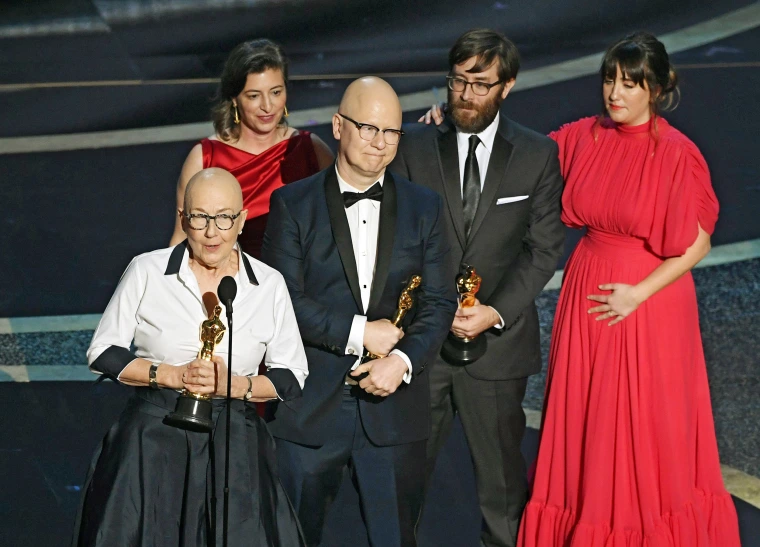Wonder Makes Me Tell the Story
Love for film editing leads to an Oscar win for Lindsay Utz ’03.
When renowned documentary filmmakers Steven Bognar and Julia Reichert finished shooting their movie “American Factory” three years ago, they had some 2,000 feet of raw film footage.
The pair had gotten access to a factory in Ohio where a Chinese company had opened an auto glass operation in an old General Motors shop. They spent hundreds of hours filming the culture clash between workers and managers in this global experiment.

The pair typically edit their movies themselves, but this project had become so big, Bognar says, that they sought an outside editor.
They met up with Lindsay Utz, a 2003 alumna of the University of Arizona’s School of Theatre, Film & Television. Then just 35 years old — about half the age of the directors — Utz had already made a name for herself, notably for editing the 2017 documentary “Quest,” a story about race and class that followed 10 years in the lives of one Black family in Philadelphia. The movie had been screened on PBS and at Sundance.
“We saw ‘Quest;’ it was a wonderful movie, edited brilliantly,” Bognar says. Utz got the job.
“They sent me the hard drive of raw material,” Utz says. “It was incredible.”
The footage was filled with vivid scenes in the noisy factory, where workers who once made $29 an hour for GM were now laboring for $12 an hour. But the directors had also done a series of formal interviews away from the plant that, to Utz’s eye, disrupted the narrative.
“It was such rich material,” she says, “The interviews were beautiful, but I was so much more drawn to the footage of things happening in the present tense.”
At Arizona, she’d become a big fan of cinema verité, a fly-on-the-wall technique that has the camera recording and shooting real people in real time. To tell the documentary’s story of conflicts over wages and safety and unions, Utz felt this unvarnished technique was the best approach.
When Utz delivered her verdict that the out-of-factory interviews ought to go, Reichert and Bognar were, at first, stunned.
“Lindsay challenged us,” Bognar says. “She said, ‘Let’s do cinema verité.’ She showed us how to put it together. She talked about the flow. She was brilliant.
“We considered deeply. And we came around.”
Utz cut the film and turned it into a gripping present-tense piece, where workers and managers speak freely inside the clanking factory. The movie was a hit, with critics admiring both the timeliness of the story and the unique way it was told.
And at the 2020 Academy Awards in February, “American Factory” won the Oscar for best documentary.
Utz didn’t originally plan to study filmmaking. She came to Tucson from her native Chicago “craving sunshine and mountains” and planned to be a creative writing major.
But a few years in, she took a class from Beverly Seckinger on the history of documentary.
“We watched a lot of classics: ‘Salesman,’ ‘Night and Fog,’” Utz says. “I got swept up in those older, beautiful films. I couldn’t believe they existed. Such a discovery! They introduced me to cinema verité.”
Utz was hooked. She switched her major to media arts, and she started shooting documentaries.

At the 2020 Independent Spirit Awards. / REUTERS, Lucas Jackson photo | At the 2020 Academy Awards / Kevin Winter, Getty Images photo

At the 2020 Independent Spirit Awards. / REUTERS, Lucas Jackson photo | At the 2020 Academy Awards / Kevin Winter, Getty Images photo
Her first short, about a dog park in Tucson, was “a cut above the other students’ work,” Seckinger says. “She clearly had a feel for it.”
Utz loved editing films too, so much so that she’d stay at school working until the wee hours. “I was always there super late — there’s so much freedom in the form.”
After college, Utz literally sailed into her first job, traveling around the Pacific on the Semester at Sea ship to edit a “voyage video” for the parents of the college students aboard. For her next — and briefest — job, she shot videos of houses on the market for a real estate agent. She quit the first day.
Wanting to do serious work, she started her own company and made videos for social justice organizations in Portland. But her big break came when she was recruited by Good Magazine in Los Angeles to create videos for its website.
Today, online videos are common for all kinds of media, but in the 2000s, few outlets used them.
“Vice was doing it, and we were. No one else was. It was really exciting.”
Eventually, the company sent her East to open a New York production office, where she worked as producer and director and overseer of everything else. The team created a daily news show and short movies, and she got to work with stars like Danny DeVito and RuPaul.
After some great years, she yearned to make full- length movies.
“My heart was in the editing room,” she says. “I was in my late 20s. I had to figure out how to break in.”
She got a chance when she met Lee Hirsch, a filmmaker who was finishing up his documentary “Bully.” She offered to edit a short sample for free. Hirsch liked it so much he hired her to edit the movie. The film was short-listed for the Oscar, and she was awarded a film-editing fellowship for her work on it.
After that success, Utz was in demand: She edited “In Country,” “Buoy” and “Quest,” the movie that brought her to Reichert and Bognar. “American Factory” pulled her into the big time. It premiered at Sundance in 2019, got picked up by Netflix, and was selected by former President Barack Obama and Michelle Obama as the first offering from their Higher Ground production company.
She also returned to her alma mater, courtesy of Seckinger, to do a workshop with film students and to attend a screening of the movie at Tucson’s The Loft Cinema.
Utz describes the runup to the Oscars, with its avalanche of interviews and appearances, as “a trip!” She was nervous at the ceremony, but when “American Factory” was named best documentary, she says, “It was thrilling to go up on the stage with Steve and Julia. They’re such wonderful people.” And they gave a shout out on stage to their editor.
The movie will be streamed on Criterion, a prestigious film library.
“It’s going to age well,” Utz believes. “I think it will be watched 20 years from now. It captures a moment.”
Since she finished her work on “American Factory,” Utz has edited the new Taylor Swift documentary “Miss Americana,” a serious work that delves into Swift’s decision to speak out on political issues. Now, Utz is hard at work editing a documentary on the skyrocketing young singer-songwriter Billie Eilish.
“Lindsay is now a top-shelf editor,” Seckinger says proudly. “She has her pick of any project.”
